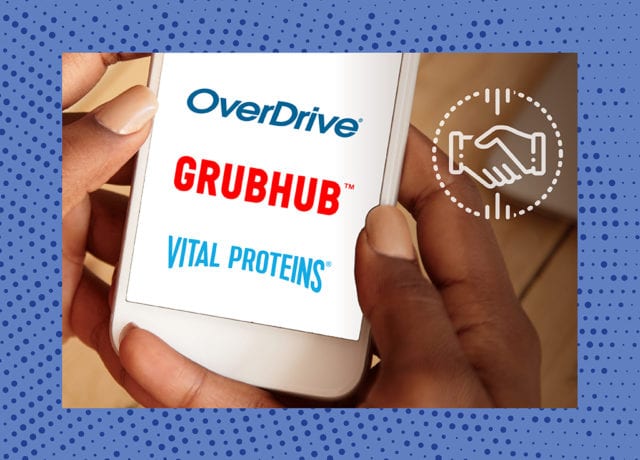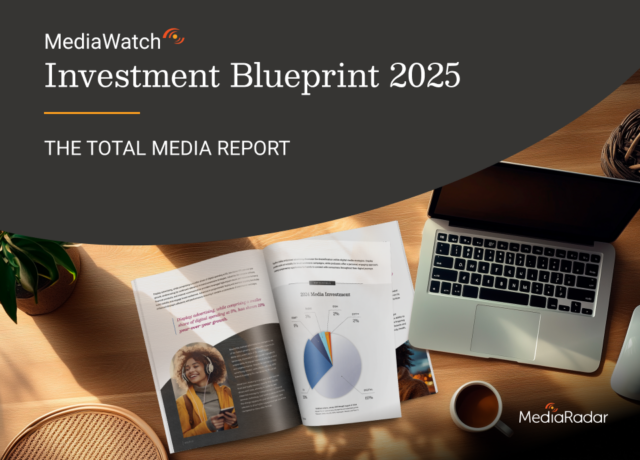In keeping with our mission to provide comprehensive advertising analysis, MediaRadar puts together a report of the most important mergers and acquisitions news each week. Stay in the loop, whether you sell advertising space or focus on business development.
This week, KKR purchases OverDrive. Grubhub will have a new owner (and it’s not Uber Eats) and Nestle Health Science expands its wellness portfolio with Vital Proteins.

KKR acquires eBook company OverDrive
The private equity investment firm KKR has completed its acquisition of eBook company OverDrive, Inc. The deal, first announced on Dec 24th last year, between KKR and OverDrive’s previous owner, Rakuten was expected to close in the first quarter of 2020.
The financial terms of the deal have not been made public.
OverDrive is the leading digital reading platform currently serving 43,000 schools, libraries, and retailers in more than 75 countries. KKR also owns RBmedia, one of the largest independent publishers and distributors of audiobooks.
This investment in digital media platforms reflects a trend in rapidly declining print markets as digital adaption accelerates throughout schools and libraries.
Just Eat Takeaway sweeps in to buy Grubhub
Just Eat Takeaway announced an agreement to buy Grubhub for $7.3 billion in an all-stock deal.
Takeaway is a Dutch-based company specializing in online food ordering and home delivery. The company said it would value Grubhub at $75.15 per share, a 27% premium to the closing price of $59.05. Matt Maloney, the founder and chief executive of Grubhub will join Takeaway to oversee its North American business.
Purchasing Grubhub, which includes operations of the brand Seamless, will give Takeaway a strong foothold in the US market, making it a trans-Atlantic delivery giant at an opportune time for expansion as restaurants are forced to find ways to serve customers in various stages of lockdown.
The deal comes as a surprise twist since it was reported earlier this year that Uber was in talks to acquire Grubhub and combine it with Uber Eats, which would have made the single largest US food delivery service.
That deal seemed to have collapsed under antitrust regulations. The current food delivery leader in the US is DoorDash, which controlled 33% of the market at the end of 2019.
Nestle Health Science gains majority stake in Vital Proteins
Nestle Health Science has agreed to acquire a majority stake in Vital Proteins, a collagen brand which produces a variety of powders, beverages, capsules, and bars. The financial details of the acquisition are not being released
Based in Chicago, Vital Proteins is the leading provider of collagen products in the US, and will operate as a standalone business with founder and CEO Kurt Sidensticker remaining at the helm.
As part of the Nestle Health Science portfolio, Vital Proteins will gain access to resources, scale, and capabilities to expand its business and brand. NHS also owns other vitamin, mineral, supplement and wellness brands: Atrium Innovations, Garden of Life, Pure Encapsulations and recently acquired Persona.
In Other News
Want more updates? Here’s what else we’re paying attention to:
- Materion, a multinational company specializing in high-performance engineered materials, announced it has entered into a definitive agreement to acquire Optics Balzers AG, a leading producer of film optical coatings.
- According to CNBC, Telemedicine giant Amwell, formerly known as American Well, is preparing for its IPO, following a surging demand for telehealth service amid the COVID-19 pandemic.
- Online used cars sales platform Vroom, Inc. is the latest startup to find its way to the public trading market with investor enthusiasm.
- Simon Property Group, Inc., the largest mall operator in the U.S., announced that it has exercised its contractual rights to terminate its previously announced acquisition of Taubman Centers, Inc.
- The Stop & Shop Supermarket Company and King Kullen Grocery Co., Inc. jointly announced that they have terminated their merger agreement signed in December 2018 due to unforeseen changes in the marketplace in the past few months caused by COVID-19 pandemic.



